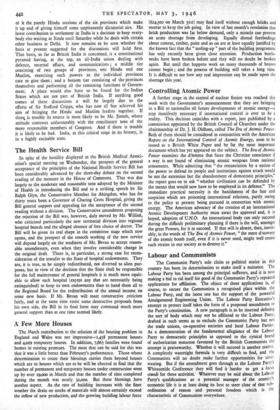The Health Service Bill
In spite of the hostility displayed at the British Medical Associ- ation's special meeting on Wednesday, the prospect of the general acceptance of the principles of the National Health Service Bill has been considerably advanced by the three-day debate on the second reading of the measure in the House of Commons. That was due largely to the moderate and reasonable tone adopted by the Minister of Health in introducing the Bill and to a striking speech by Sir Ralph Glyn, the Conservative Member for Abingdon, who has for thirty years been a Governor of Charing Cross Hospital, giving the Bill general support and appealing for the acceptance of the second reading without a division. The Conservative amendment proposing the rejection of the Bill was, however, duly moved by Mr. Willink, who criticised particularly the new territorial division into regional hospital boards and the alleged absence of free choice of doctor. The Bill will be given its real shape in the committee stage which now opens, and the prospect of the smooth working of the new service will depend largely on the readiness of Mr. Bevan to accept reason- able amendments, even when they involve considerable change in the original draft. There is, in particular, a strong case for recon- sideration of the transfer to the State of hospital endowments. They are, it is true, to be simply redistributed, not diverted to alien pur- poses, but in view of the decision that the State shall be responsible for the full maintenance of general hospitals it is much more equit- able to allow each hospital (except any that are necessarily being extinguished) to keep its own endowments than to hand them all to the Regional Board for the redistribution of the annual income on some new basis. If Mr. Bevan will meet constructive criticism fairly, and at the same time resist some destructive proposals from his own side, the Bill in its final form may command much more general support than at one time seemed likely.






























 Previous page
Previous page